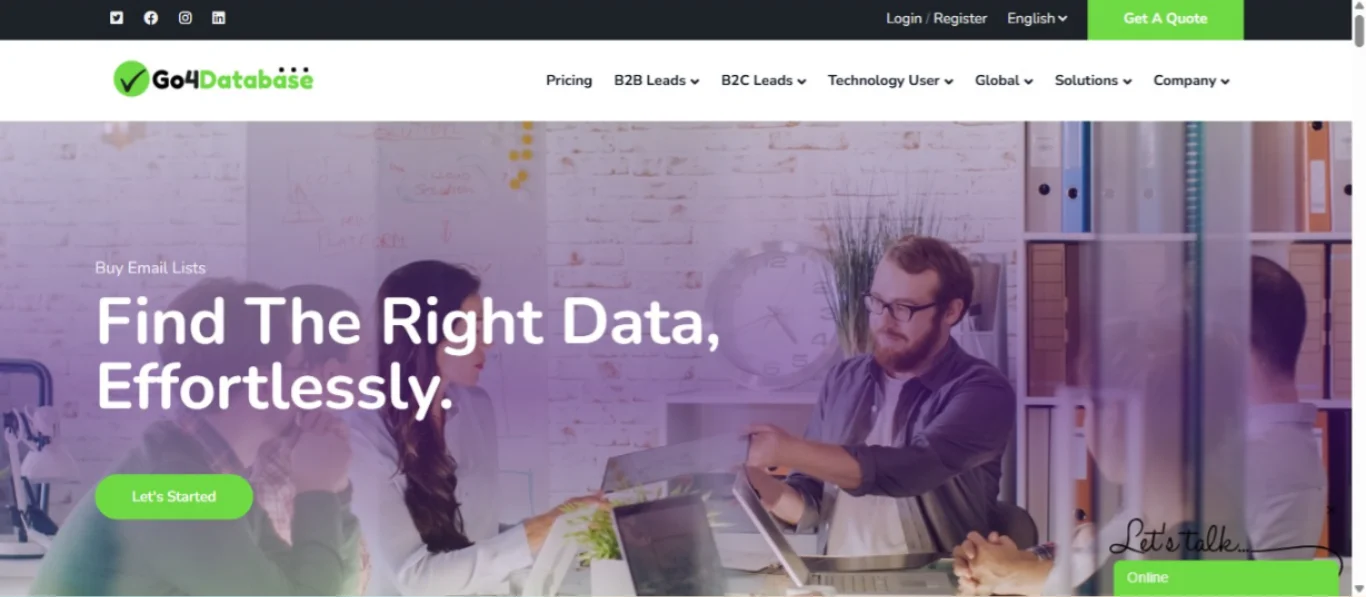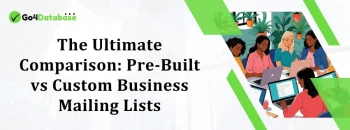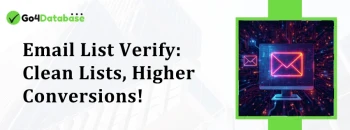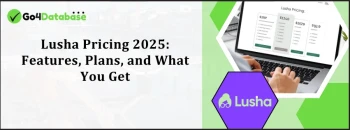Welcome back, brand builders! Today’s piece might just change your campaign tone.
I hope you've been well. I am Payal, and I will guide you through this entire blog.
Today's blog is primarily about avoiding all the red flags before buying a Business Mailing List.
What is a Business Mailing List?
A business mailing list is a curated database of contact details—such as email addresses, phone numbers, and company info of professionals or organizations. It’s used for targeted marketing, lead generation, and outreach to potential clients within specific industries or niches.
Table Of Content Business Mailing List:
1. Know Your Target Audience Before You Buy
2. Key Features of a Quality Business Mailing List
3. How to Verify the Accuracy of Email Data
4. Red Flags: What to Avoid in a Mailing List Provider
5. Legal & Ethical Considerations You Should know about
6. Go4Database, Your Business Mailing List Friend
7. Final Checklist Before You Make the Purchase
Know Your Target Audience Before You Buy
In today’s fast-moving world, businesses need direct ways to reach their customers. Emails are one of the most effective tools for this.
A business mailing list gives you a set of contacts you can use to share updates, promote services, or build relationships.
Instead of waiting for customers to find you, business mailing lists help you go straight to them.
TL;DR
Business mailing lists help companies reach the right audience quickly and cost-effectively. They boost engagement, build trust, and drive growth—especially for startups and B2B firms. But not all lists are equal; poor-quality or unverified contacts can harm your brand. This guide shows how to choose the right list wisely.
Whether you’re launching a product or offering a discount, a well-built business mailing list lets you reach the right people at the right time.
Startups and small businesses highly benefit from this.
It saves time and money that would otherwise go into random and unnecessary marketing.
With a good list, you’re not sending emails randomly. You’re targeting people who might actually be interested.
For B2B companies, business mailing lists are useful for reaching other businesses, decision-makers, or key clients.
This can lead to sales, partnerships, or long-term deals.
If your list is well-planned and regularly updated, your chances of getting replies go up. A business mailing list also helps build trust.
When people get useful, relevant emails from your side, they start to recognize your brand.
Over time, this trust can turn into loyalty and growth. But not all mailing lists are the same. Some are full of fake or outdated contacts.
Some are built without permission, which can get you in trouble. That’s why it’s important to know what you’re buying.
In this blog, I’ll help you understand what to look for before you buy a business mailing list.
From checking data quality to avoid spam traps. I’ll guide you through each step so you can make the right choice.
Key Features of a Quality Business Mailing List
A business mailing list can help you grow faster only if it’s built the right way.
A poor-quality list leads to low response rates, spam complaints, and a damaged sender reputation.
TL;DR
A quality business mailing list boosts growth only if it’s accurate, targeted, and permission-based. Look for verified data, full contact details, high deliverability, segmentation options, and low spam complaints. Avoid poor lists to protect your brand, improve engagement, and run cost-effective email campaigns that truly connect with the right audience.
Before buying any business mailing list, check for the following features to make sure it's worth your money:
1. Accurate and Verified Data
The most important thing is that the information is correct. Many mailing list contain fake or outdated contacts.
Always look for lists that are verified and cleaned regularly. This means emails are checked for spelling errors, domain issues, and inactive status.
Why it matters:
- Reduces email bounces
- Increases open and reply rates
- Saves you time and effort
2. Targeted Contacts
The business mailing list should match your audience.
Ask these questions before buying:
- Is the list relevant to your industry?
- Can you filter by job title, company size, or location?
- Are these people likely to be interested in your offer?
Why it matters:
- Helps you run better campaigns
- Improves conversion rates
- Saves marketing costs
3. Full Contact Details
A good business mailing list should offer more than just an email address.
The more data points you have, the better your chances of list building real connections.
Look for:
- Full name
- Job title
- Company name
- Phone number
- LinkedIn profile (if available)
- Industry and location
Why it matters:
- Helps with personalization
- Builds trust and engagement
- Increases chances of getting replies
4. Permission-Based List
You should only use lists where the contacts have given consent to receive marketing mailing list.
These are called opt-in or permission-based lists. Buying non-consensual data is risky. It can get your emails marked as spam or even blocklisted.
Why it matters:
- Protects your brand’s reputation
- Keeps you compliant with email laws like GDPR
- Reduces spam complaints
5. Segmented and Customizable
A quality list gives you the option to segment your audience.
Segmentation means dividing your contacts based on factors like industry, role, location, or buying behavior.
Why it matters:
- Helps you send targeted messages
- Increases relevance and response
- Makes follow-up easier
6. High Deliverability Rate
Ask the provider about the business mailing list’s average deliverability rate.
This means how many emails actually reach inboxes instead of bouncing or landing in spam.
A good list should have a deliverability rate of 90% or more.
Why it matters:
- Ensures your message gets seen
- Protects your domain from being marked unsafe
- Improves your email campaign performance
7. Low Complaint and Unsubscribe Rate
A healthy mailing list has fewer complaints and unsubscribes.
If too many people mark your email as spam, it affects your future campaigns.
Why it matters:
- Keeps your sender reputation clean
- Ensures better inbox placement in future
- Builds trust with your audience
How to Verify the Accuracy of Email Data
Buying a mailing list is a big step. But how do you know if the emails on the list are real, active, and safe to use?
That’s where verification comes in. Verifying email data is a process that checks whether the contact details are correct, current, and deliverable.
Sending emails to wrong or inactive addresses can hurt your sender reputation and waste your marketing efforts.
Here’s what you can do to verify the accuracy of email data:
1. Ask for a Sample Before Buying
Always request a sample of the mailing list before making a purchase.
Review the sample and check:
- Do the email addresses look valid?
- Are names and job titles included?
- Is the data consistent and complete?
This gives you a first impression of the business mailing list’s quality.
2. Use Email Verification Tools
There are many tools available online that check if an email address is active or not.
Popular tools include:
- NeverBounce
- ZeroBounce
- BriteVerify
These tools can:
- Detect invalid or fake emails
- Remove duplicates
- Check for risky or spam-trap emails
3. Check Domain Validity
A professional email should come from a valid business domain (like @companyname.com).
Avoid emails with personal domains like @gmail or @yahoo if you're targeting businesses.
Use domain lookup tools to:
- Check if the domain exists
- Confirm if it's linked to a real business
- See if it’s blacklisted
4. Look for Timestamp or Last Updated Info
Some list providers share when the data was last verified or updated. Always prefer business mailing lists that are recently verified.
Older lists may have contacts that changed jobs or stopped using that email.
5. Manual Spot Check
Pick 5–10 contacts from the list and do a quick manual check. Search their names and companies on LinkedIn or Google.
See if their job title and company match the list. This step may take a few minutes, but builds trust in the data.
Red Flags: What to Avoid in a Mailing List Provider
Choosing the right mailing list provider is just as important as the list itself. A poor-quality provider can give you outdated, fake, or even illegal data.
TL;DR
Choosing a mailing list provider? Watch for red flags: unclear data sources, no sample list, unrealistic promises, no refunds, missing contact info, lack of consent policy, suspiciously low prices, and bad or no reviews. These signs could mean outdated, fake, or illegal data—risking your money, reputation, and legal compliance.
To protect your time, money, and brand, these are the red flags you should never ignore when picking a mailing list provider:
1. No Clear Source of Data
A trustworthy provider will tell you where the data comes from.
Avoid any company that says the data is “collected from various sources” without naming them.
Why it matters: If the source is unknown, the data could be scraped, stolen, or outdated.
2. No Option for a Sample List
Reliable providers usually give you a small sample before you buy the full list.
If a provider refuses to give a sample or tries to avoid the request, it’s a warning sign.
Why it matters: You need to check the quality before making a payment.
3. Too-Good-To-Be-True Promises
If a provider says the list is “100% accurate,” “never bounces,” or “guarantees instant leads,” be careful.
There’s no such thing as a perfect list. Even the best business mailing lists may have a small error rate.
Why it matters: Overpromising often means under delivering.
4. No Refund or Return Policy
Avoid companies that don’t offer any refund, even if the data turns out to be wrong.
Good providers offer money-back guarantees or at least partial refunds for bad data.
Why it matters: Without a refund option, you risk losing money on useless data.
5. Missing Contact Information on Their Website
Check their website for a phone number, email address, and office location.
If they only have a contact form or just an email, they may be hiding behind anonymity.
Why it matters: It becomes harder to reach them if there’s a problem after purchase.
6. No Data Privacy or Consent Policy
If the provider cannot prove that the contacts have given permission to be contacted, avoid them.
You should not buy lists that go against email marketing laws like GDPR or CAN-SPAM.
Why it matters: Using non-consensual data could get your emails blocked or even land you in legal trouble.
7. Very Low Prices for Very Large Lists
Some companies offer thousands of emails for a very low price.
This might look tempting but be cautious. Low-cost lists often include fake, outdated, or irrelevant contacts.
Why it matters: Cheap data usually means low quality and high risk.
8. Bad Online Reviews or No Reviews at All
Always search for reviews before buying. If a provider has many negative reviews or no reviews at all it’s better to avoid them.
Check sites like Trustpilot, G2, or even LinkedIn.
Why it matters: Real feedback from users helps you make a safer choice.
Legal & Ethical Considerations You Can’t Ignore
Buying and using a business mailing list is not just a marketing decision it’s also a legal and ethical responsibility.
If you ignore the laws or misuse data. It can damage your brand, cost you money, or even lead to legal trouble.
TL;DR
Buying and using a business mailing list comes with legal and ethical responsibilities. Follow privacy laws like GDPR and CAN-SPAM, use only permission-based lists, include clear unsubscribe options, be transparent, honor deletion requests, and never resell data. Violating these rules risks fines, legal action, and damage to your brand.
So before you send even one email, you need to understand what’s allowed and what’s not.
These are the key legal and ethical considerations you must follow:
1. Understand Data Privacy Laws
Different countries have different rules about collecting, storing, and using personal data.
Some of the most important laws include:
- GDPR (General Data Protection Regulation): Applies to the EU
- CAN-SPAM Act: Applies to the United States
- PECR (Privacy and Electronic Communications Regulations): Applies to the UK
- India’s Digital Personal Data Protection Act: Also coming into force soon
What these laws generally require:
- You must have permission (consent) to send marketing emails
- You must clearly identify yourself and your business
- You must give the recipient a way to opt out or unsubscribe
- You must delete data if the person requests it
Why it matters: Breaking these laws can lead to huge fines and legal action.
2. Only Use Permission-Based Lists
This is the golden rule. If someone has not agreed to receive marketing emails, you should not email them.
This is what we call opt-in consent. Avoid lists that are scraped from websites, forums, or social media.
Always ask the provider:
- How was the data collected?
- Do you have proof of consent?
- Can the user unsubscribe easily?
Why it matters: Using non-permissioned data is illegal in many countries and can get you blacklisted by email service providers.
3. Add Unsubscribe Options in Every Email
Every email you send should include a clear and easy way for the recipient to opt out.
This is required by most international email laws. Avoid hiding the unsubscribe button or making it complicated.
What to include:
- A visible unsubscribe link
- A simple message like “Click here to unsubscribe”
- A process that takes no more than one step
Why it matters: Failing to include this is a direct violation of email marketing laws.
4. Be Transparent With Your Identity
When you send an email, the recipient should clearly know who you are.
Your emails should include:
- Your business name
- Your full contact address
- A real reply-to email address
Why it matters: Misleading headers, fake names, or hiding your identity is not just unethical, it's illegal.
5. You must respect the right to be forgotten.
Many data privacy laws give users the right to request deletion of their data.
This means if someone asks you to remove them from your list, you must do it immediately.
What to do:
- Keep records of unsubscribe requests
- Update your database regularly
- Make deletion a smooth and fast process
Why it matters: Ignoring these requests can lead to serious legal trouble and trust issues.
6. Don’t Resell or Share Purchased Data
If you buy email list, it’s usually for your business use only.
Selling or passing that list to others is unethical and often against the law. Always check the license terms before using or sharing a mailing list.
Why it matters: Unauthorized use of data can lead to lawsuits or bans from email platforms.
Go4Database, Your Business Mailing List Friend
Finding a reliable business mailing list provider is not easy. Many companies offer bulk data, but not all can promise accuracy, legality, and real value.
That’s where Go4Database stands out. If you are looking for a business mailing list that delivers results without risk, we’re here for you.

Here’s why Go4Database can be your trusted partner in business data solutions:
1. Verified and Updated Business Data
We believe that data is only useful when it is accurate and updated.
At Go4Database:
- All email addresses and contact details are verified before delivery
- We regularly update our databases to remove outdated or inactive records
- We ensure data accuracy through automated tools and human checks
This means you get real b2b contacts that work not bounced emails or dead leads.
2. Permission-Based Lists Only
We follow ethical and legal standards in collecting and sharing data.
Our mailing lists are:
- Permission-based
- Collected through legal and transparent means
- Fully compliant with global data privacy laws like GDPR and CAN-SPAM
This helps you avoid legal trouble and protects your brand image.
3. Targeted Lists That Match Your Needs
Every business has different goals. That’s why we offer customized solutions.
With Go4Database, you can choose your mailing list based on:
- Industry or sector
- Job title or decision-maker level
- Company size or location
- Specific regions (India, US, UK, Middle East, etc.)
You don’t waste time or money on irrelevant contacts. You get what suits your business.
4. Free Sample Before You Buy
We believe in building trust before selling. So, we always provide a free sample of the mailing list.
What this sample helps you do:
- Check the quality and format of data
- Review if the contacts are suitable for your business
- Make a confident buying decision
No hidden data. No guesswork. Just real, clear information.
5. Affordable and Transparent Pricing
Our pricing plans are simple and budget-friendly.
We offer:
- No hidden fees
- No forced subscriptions
- One-time purchases with full access to data
You pay only for what you need, nothing extra.
6. Dedicated Customer Support
We understand that using a mailing list can raise questions.
Our team is always ready to:
- Help you choose the right list
- Assist with technical or formatting issues
- Provide support even after purchase
We don’t disappear after the sale. We stay with you until your campaign succeeds.
7. Secure and Responsible Data Handling
At Go4Database, we take data protection seriously.
We use safe systems to:
- Protect your purchase
- Secure your download
- Ensure no third party gets access to your data
Your trust is our responsibility. Trust our verified business contacts and B2B email list tailored to your niche. Whether you're looking to buy a business mailing list.
Or need precision through business list segmentation, we’ve got you covered.
Enjoy 95% email list accuracy and a targeted email list list that gets real results.
Also Read: Go4database Buying Guide: Choose a Targeted Email List That Works for You
Final Checklist Before You Make the Purchase
Before you spend money on a business mailing list, make sure you’ve checked every important box. A wrong purchase can waste your budget and harm your email reputation.
Here’s a quick and practical checklist to review:
1. Source Transparency
- Do you know where the data is coming from?
- Has the provider explained how they collect it?
- If the source is unclear, it’s better to walk away.
2. Proof of Consent
- Are the contacts permission-based?
- Has the provider confirmed compliance with laws like GDPR or CAN-SPAM?
Avoid lists built from scraped or illegal sources.
3. Targeted and Relevant
- Does the list match your ideal customer profile?
- Have you selected the right industry, location, or job roles?
- A targeted list saves time and improves your email response rate.
4. Data Accuracy Guarantee
- Has the provider promised high accuracy?
- Do they offer bounce rate limits or quality checks?
- Make sure outdated or fake emails don’t waste your campaign.
5. Refund or Replacement Policy
- Does the provider offer a money-back or replacement policy?
- What happens if the data quality is poor?
- A no-refund policy is a major red flag.
6. Sample Check
- Have you seen a sample of the data before purchase?
- Did you test a few emails to check their validity?
- Always ask for a sample to avoid blind purchases.
Frequently Asked Questions (FAQs)
1. How do I know if the business mailing list is accurate?
The accuracy of a business mailing list depends on its source and how frequently it's updated.
Reliable providers verify data using automated tools and human checks. Before buying, ask for a sample of the business mailing list to check the quality and make sure the contacts are valid.
2. Is it legal to buy and use a business mailing list?
Yes, it’s legal to buy and use a business mailing list, but you must ensure the provider follows data privacy laws such as GDPR, CAN-SPAM, and others.
The list should be permission-based, meaning the contacts have opted in to receive marketing communications.
Always check the provider’s compliance with these regulations.
3. Can I customize the business mailing list based on my target audience?
Absolutely. Most reliable mailing list providers allow you to customize the list based on specific criteria, such as industry, job title, location, or company size.
This ensures you’re reaching the right people for your marketing campaign.
4. What if I get invalid or outdated emails?
A trustworthy provider, like Go4Database will offer a money-back guarantee or replacement policy if you receive invalid or outdated data.
Always check the provider’s refund policy before making a purchase to ensure you’re protected if the list doesn’t meet expectations.






